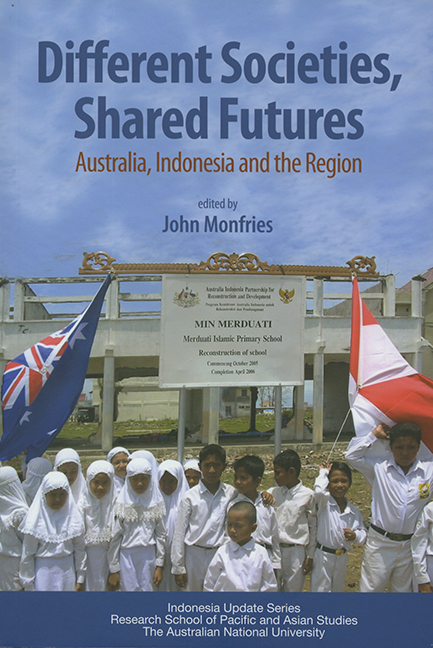Book contents
- Frontmatter
- Dedication
- Contents
- Tables
- Figures
- Contributors
- Acknowledgments
- Opening Address by Richard Woolcott AC
- 1 Introduction
- PART I Regional Viewpoints
- PART II Security Aspects
- PART III Mutual Perceptions and Irritations
- PART IV The Economic Partnership: Aid, Economics and Business
- 10 The Australia–Indonesia Partnership for Reconstruction and Development
- 11 The SBY Promise to the Business World
- 12 Australia and Indonesia in the Wider Context of Regional Economic Relations
- PART V Conclusion
- Glossary
- References
- Index
11 - The SBY Promise to the Business World
from PART IV - The Economic Partnership: Aid, Economics and Business
Published online by Cambridge University Press: 21 October 2015
- Frontmatter
- Dedication
- Contents
- Tables
- Figures
- Contributors
- Acknowledgments
- Opening Address by Richard Woolcott AC
- 1 Introduction
- PART I Regional Viewpoints
- PART II Security Aspects
- PART III Mutual Perceptions and Irritations
- PART IV The Economic Partnership: Aid, Economics and Business
- 10 The Australia–Indonesia Partnership for Reconstruction and Development
- 11 The SBY Promise to the Business World
- 12 Australia and Indonesia in the Wider Context of Regional Economic Relations
- PART V Conclusion
- Glossary
- References
- Index
Summary
President Susilo Bambang Yudhoyono (SBY) swept into office on 20 October 2004 on the back of popular support not seen in Indonesia since the early days of the republic, that is, if we discount the ‘landslide election victories’ during the Soeharto era.
Optimism flooded the nation as Indonesians of most political persuasions – SBY had won more than 60 per cent of the vote – ushered him into the job that was waiting for him. People were reminded of the secret hope for a ‘white knight’ (satrya piningit) who would rescue the country from the clutches of an evil regime that seemed to have been in power forever. In the mid-1990s, as President Soeharto's stifling stranglehold appeared unshakeable and as Indonesians watched with resignation as the president's eldest daughter appeared to be getting ready to accept the sceptre from the ageing autocrat, anxious whispers, not restricted to believers in Javanese mysticism, began to make the rounds that a satrya piningit was waiting in the wings to come to the rescue of the nation at the right moment. After President Soeharto's ‘abdication’, the presidents that ruled in quick succession, respectively the diminutive non-Javanese (B.J Habibie), the blind cleric (Abdurrahman Wahid or ‘Gus Dur’) and the daughter of the first president (Megawati Sukarnoputri), did not exactly live up to the image of a Javanese knight, so when the scholarly general with his ‘presidential’ demeanour and matching physique was duly elected, people recollected the dreams and there were knowing nods all round that this might be the knight the nation had been longing for. So, with some delay, the prophecy proved to be accurate after all.
The depth and breadth of goodwill and support was such that right after the results of the presidential election in September 2004 became inescapably clear, political analysts issued dire warnings that the almost desperate longing for a superhuman to turn things round might turn into disillusionment if the president failed to deliver within a relatively short period of time.
- Type
- Chapter
- Information
- Different Societies, Shared FuturesAustralia, Indonesia and the Region, pp. 143 - 155Publisher: ISEAS–Yusof Ishak InstitutePrint publication year: 2006



